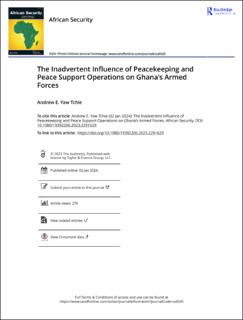| dc.contributor.author | Tchie, Andrew E. Yaw | |
| dc.date.accessioned | 2024-02-22T12:01:42Z | |
| dc.date.available | 2024-02-22T12:01:42Z | |
| dc.date.created | 2024-01-11T14:40:05Z | |
| dc.date.issued | 2023 | |
| dc.identifier.citation | African Security. 2023, . | en_US |
| dc.identifier.issn | 1939-2206 | |
| dc.identifier.uri | https://hdl.handle.net/11250/3119328 | |
| dc.description.abstract | Over the last two-three decades, the United Nations (UN), the African Union (AU) and Regional Economic Community or Regional Mechanisms (RECs/ RMs) have significantly improved the efficiency of their Peacekeeping Operations (PKOs) and Peace Support Operations (PSOs) across the African continent. Arguably, the combination of effort(s) by the UN, AU and RECs/ RMs since the early 1990s has facilitated a decline in the number and intensity of armed conflicts, but equally, over recent decades, there has been an expan-sion of PKOs and PSOs across Africa.1,2,3 Undoubtedly, AU and RECs/RMs member states have gained considerable experience in PKOs and PSOs, expediting their greater contributions to international peace and security matters | |
| dc.language.iso | eng | en_US |
| dc.rights | Navngivelse 4.0 Internasjonal | * |
| dc.rights.uri | http://creativecommons.org/licenses/by/4.0/deed.no | * |
| dc.title | The Inadvertent Influence of Peacekeeping and Peace Support Operations on Ghana’s Armed Forces | en_US |
| dc.title.alternative | The Inadvertent Influence of Peacekeeping and Peace Support Operations on Ghana’s Armed Forces | en_US |
| dc.type | Peer reviewed | en_US |
| dc.type | Journal article | en_US |
| dc.description.version | publishedVersion | |
| dc.source.pagenumber | 0 | en_US |
| dc.source.journal | African Security | en_US |
| dc.identifier.doi | 10.1080/19392206.2023.2291629 | |
| dc.identifier.cristin | 2224729 | |
| cristin.ispublished | true | |
| cristin.fulltext | original | |
| cristin.qualitycode | 1 | |

